Iran’s Top Sunni Leader Urges Halt To Surging Executions
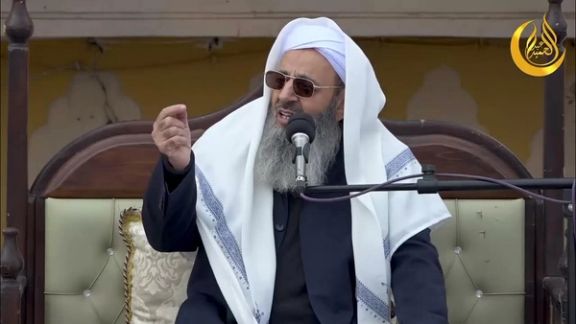
Iran’s top Sunni leader has reiterated concerns over the rising number of executions, stating that repression has failed to deter people from pursuing their demands.

Iran’s top Sunni leader has reiterated concerns over the rising number of executions, stating that repression has failed to deter people from pursuing their demands.
During his Friday sermon in Zahedan, capital of southeastern Sistan-Baluchestan Province, Mowlavi Abdolhamid called for a halt to political and drug-related executions, that has shocked not only Iranians but also the entire world.
The majority of executions in Iran are related to drug-related convictions. Abdolhamid has repeatedly said that lack of jobs in his province and some other impoverished areas is the prime reason people are driven to smuggling fuel, minor drug-related offences, or drug trafficking.
In Iran gasoline and especially diesel are extremely cheap (around 10 US cents per gallon) due to heavy government subsidization. This leads to smuggling of fuel to neighboring countries such as Pakistan. Many of these individuals, the cleric said, end up in prison or even executed.
Referring to political charges against protesters that potentially lead to the death penalty, he highlighted that during the time of the Prophet of Islam, executions were as rare as the fingers of one hand, and those were related to "retribution."
"The Prophet did not even execute those who provided information to the enemies and said that if I do this, they will say that he kills his own people and is not loyal to them," Abdolhamid told his congregation.
Since December 2022, at least nine protesters have been executed in connection with the Women, Life, Freedom protests, and the ensuing crackdown. According to Human Rights Activists News Agency, in 2023 alone, at least 791 citizens, including 25 women and two juvenile offenders, were executed -- a 33 percent increase compared to the previous year. Additionally, reports from Amnesty International revealed that from January 2012 to July 2023, over 5,000 individuals, including 57 children, were executed in Iran.
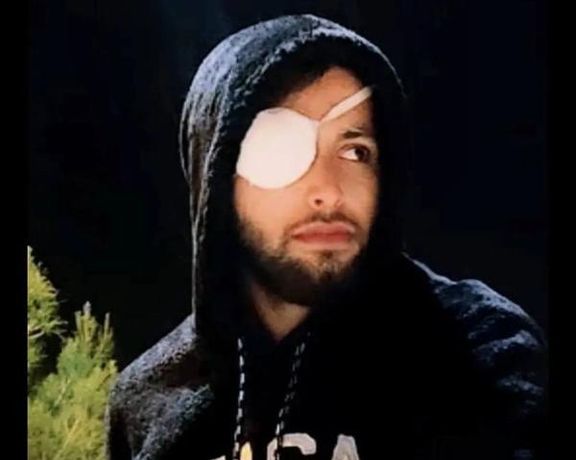
Hossein Hosseinpour, a young protestor who lost an eye after being shot by security forces during a crackdown on 2022 protests, has been sentenced to one year in prison by the Revolutionary Court.
According to the Human Rights Activists News Agency (HRANA), the sentence was reduced to 11 months after Hosseinpour agreed not to appeal the verdict.
The report said that the sentence was issued on the charge of "propaganda against the regime" and is related to posts he shared on social media.
Hosseinpour was shot in the right eye with a shotgun pellet during the nationwide protests in Mahabad in October 2022. He has undergone four surgeries so far.
In early September 2023, he was arrested by intelligence agents. After the interrogation process in the Soroush detention center in Shiraz, he was transferred to the Adel Abad prison in the same city.
In late January 2024, he was transferred to Shiraz Prison No. 2, also known as the Nezam prison. He has reportedly contracted an eye infection during his detention and continues to be denied medical care.
In recent months, there have been reports of arrests of or summonses to protesters who lost their eyes in the 2022-2023 protests. According to these reports, Amir Shahvelayati and Matin Hasani, two protesters who lost their eyes in the protests, were arrested in Tehran and Bukan, in West Azarbaijan, in January. Also, Mahbano (Kosar) Khoshnoudi, another protester who lost an eye in the nationwide protests, reported that she had been repeatedly summoned by security forces.
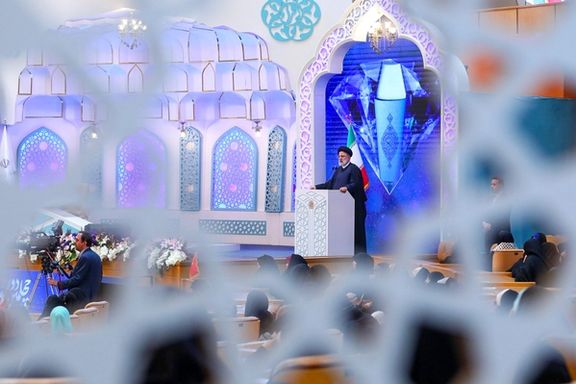
An official has disclosed that President Ebrahim Raisi is among three individuals designated by Supreme Leader Ali Khamenei to select the Islamic Republic's future leader.
Entekhab website on Wednesday quoted Hassan Ameli, a member of the Assembly of Experts that Raisi is one of the members of a committee of three appointed by Khamenei to determine his successor. Ameli said that he himself is also on the committee. Earlier, Rahim Tavakol, another Assembly member had revealed his membership in the committee.
This suggests Khamenei's confidence in Raisi's victory in the upcoming March 1 Assembly of Experts election. Raisi, the sole candidate from South Khorasan Province until last week, now faces a second candidate, for the sake of formality.
The new candidate, Hassan Rouhbakhsh has told the press in Iran that he has no intention of competing with Raisi, and that he has taken part in the election to end the embarrassing situation for Raisi and to thank the Islamic Republic for all that it has given to him during the past years.
All signs indicate that Raisi is leading the succession committee, as the other two clerics have remained relatively unknown to the public and media, except for the few thousand locals who elected them to the Assembly. Ameli, in his interview with Entekhab, disclosed that during committee meetings, Khamenei issues orders and provides advice to Raisi.
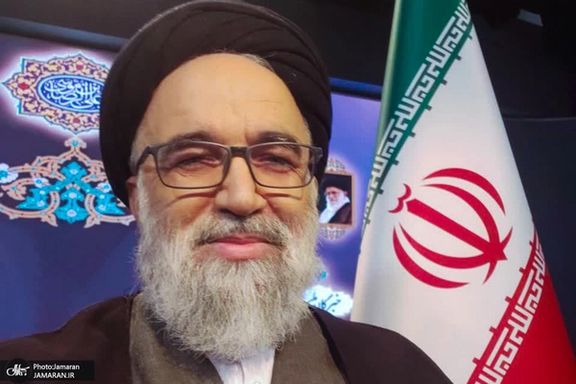
What remains unclear is the role of the remaining 85 members of the Assembly of Experts if the committee of three is tasked with "finding" the successor to the Islamic Republic's leadership. Neither Khamenei nor the committee has provided an explanation for this matter. The Assembly has the constitutional task of selecting a Supreme Leader.
Ameli emphasized that the committee's "sensitive task" makes it the most crucial committee within the Assembly of Experts. Several years ago, Ayatollah Mohsen Araki, who initially revealed the existence of the succession committee, stated that due to the sensitive nature of their mission, the committee's members remain unknown to the rest of the Assembly.
Other members of the Assembly of Experts typically refrain from discussing the issue with the media, likely because they have limited knowledge about it. Those who do comment often make humorous or bizarre remarks.
Ahmad Beheshti, a cleric from Fars Province in the Assembly, expressed his desire for Khamenei's long life in a recent interview. He hoped that Khamenei's extended tenure would obviate the need for the Assembly to select another leader.
Another member of the Assembly expressed a different perspective, stating his wish for the Shiite hidden Imam to emerge after some 15 centuries of occultation and assume leadership, thus eliminating the need for a successor to Khamenei. Behesti also expressed hope for an uneventful tenure during both the current and future rounds of the Assembly. Reflecting on his 15-year tenure as an AoE member, he mentioned that he has consistently prayed that circumstances would not require the consideration of a replacement for Khamenei.
While the personality cult gives him the likeness of a divine status among his supporters, and Assembly members often deny that part of their responsibility is to keep checks and balances on Khamenei's performance, Mahmoud Mohammadi Araghi, a member of the Assembly, has claimed that unlike other countries, the Iranian people can take the leader to court if necessary.
This comes while many in Iran, including former regime insider Abolfazl Ghadiani say they will not take part in the March 1 parliamentary and Assembly of Experts elections and will encourage others to do likewise.
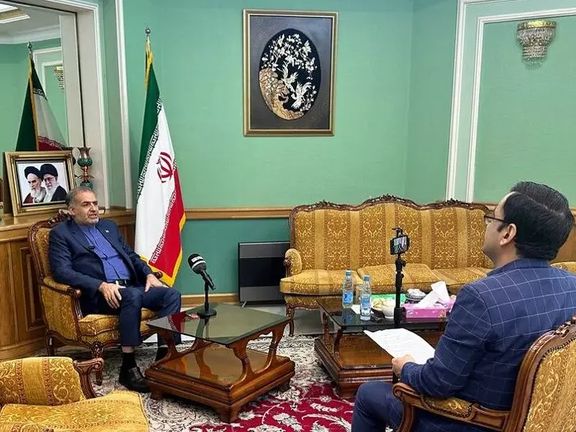
Amid reports of Tehran selling ballistic missiles to Moscow, a high-level Russian delegation is set to visit Iran next week for an event branded as Commission on Economic and Trade Cooperation.
The delegation, which will consist of about 160-170 directors and experts from various ministries, government organizations, and private sector entities in Russia, is expected to arrive in Tehran on Monday, February 26.
Kazem Jalali, the Iranian ambassador to Moscow, expressed hope that the executive agreement for the construction of the Rasht-Astara railway, one of the most important projects between the two countries, will be signed in Tehran after the remaining issues are resolved.
The Rasht-Astara connection is seen as an important link in the corridor that will connect India, Iran, Russia, Azerbaijan, and other countries by rail and by sea. The 162 km railway along the Caspian Sea coast will will be an extension of railways from Russian ports on the Baltic Sea to Iranian ports on the Indian Ocean and Gulf of Aden.
The visit comes amid reports that Iran is selling ballistic missiles to Russia. The United States has condemned the reported sale as "dangerous escalation" of the conflict in Ukraine, warning of “swift and severe response from the international community.”
US National Security Council spokesman John Kirby said Thursday that the Biden administration will impose more sanctions on Iran for supplying drones to Russia, and it would go even “further” if it’s established that Iran has given Russia ballistic missiles, implying that the US government is yet to see clear evidence of that.
Iran and Russia are the two countries with the greatest number of US sanctions against them. The United States on Friday imposed extensive sanctions against Russia, targeting more than 500 people and entities to mark the second anniversary of Moscow's invasion of Ukraine and retaliate for the death of Russian opposition leader Alexei Navalny.
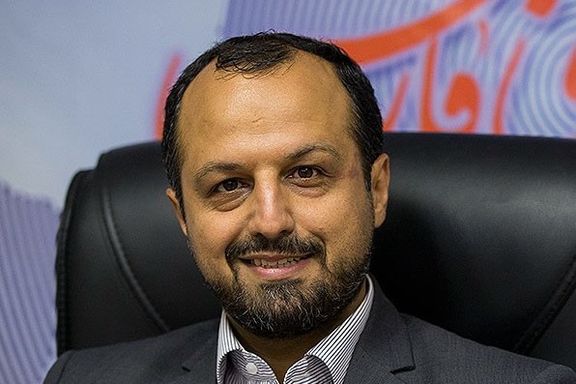
While Iran’s national currency shows no signs of bouncing back after a 13-percent fall since early January, Tehran says it does not recognize the free market exchange rates.
Minister of Economic Affairs and Finance, Ehsan Khandouzi, said Friday that “we certainly do not recognize the free market exchange rate officially.”
His remarks echo the regime’s propaganda line that the efforts to control the rial’s devaluation are effective. However, the rial has been hovering around 570,000 per dollar for ordinary people who have no access to currencies at the lower government rates.
Limited availability of foreign currency at the lower government rate has pushed buyers toward the unofficial black market. In an attempt to keep tabs on the unofficial foreign currency exchange market, the Iranian government has also criminalized a broad spectrum of "unauthorized" transactions, including those in the virtual space. However, these measures seem to have little impact on the currency's downward spiral. Currency exchange offices in Tehran are also forbidden from publicly disclosing rates.
The rial hit an all-time low late in January amid fears of US retaliation for a drone attack that killed three American servicemen in Jordan. The US dollar rose to nearly 600,000 rials, the highest since February 2022, when it briefly traded at that level.
The Iranian currency, which has steadily lost value since the 1979 revolution, has fallen about 13-fold since 2018, when then-president Trump pulled the United States out of the 2015 JCPOA nuclear deal and imposed sanctions on Iran’s oil exports and international banking. Since then, the dollar has risen from 42,000 to more than 570,000 rials. Before the establishment of the Islamic Republic in 1979, the dollar traded at 70 rials.
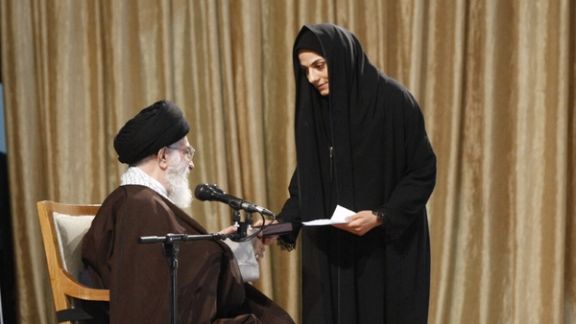
An Iranian Wushu champion who had previously presented all her medals to the Supreme Leader has been busted for doping, with the international federation ordering her to return the medals.
Maryam Hashemi, a proud member of the Revolutionary Guards (IRGC) in the Kurdish majority city of Kermanshah, had dedicated her world championship gold medal to Ali Khamenei in 2019 and in return received his Keffiyeh, a symbol of allegiance with Iran’s ruler.
"The first time I dedicated my medal to the Supreme Leader, I made a vow to myself that I will present every valuable medal I earn to him," she said in 2019. In total she had given five medals from international events to Khamenei and met with him at least seven times.
The first time she gave her medal to Khamenei was in 2013, when she made headlines for her unconventional behavior during a meeting with the country's most senior figure. Without saying anything, she got up and walked over to the Supreme Leader and handed him her medal, against set protocols.
In spite of the shame, Hashemi, who was given a four-year ban from all athletic competitions after she was found guilty of doping the anabolic steroid nandrolone in the 2019 championship in China, has now resurfaced after her ban expired in October and is looking for sponsors for her city’s team.
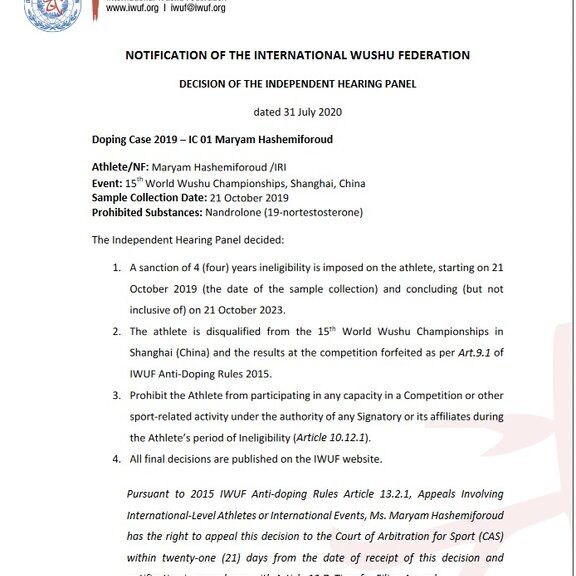
Shahrbanou Mansourian, another Iranian wushu champion, was hit with a 28-month ban from participating in any domestic and international competitions only for blowing the whistle on Hashemi’s doping and complaining that she had been fast-tracked through the national team qualifiers and picked up for the squad unfairly. “Hashemi was defeated in three qualifying contests in front of an audience of 2,000. However, they still chose her for the world competitions,” she said.
The martial artist, who consistently maintained her allegiance to the Islamic Republic principles including advertisement for wearing hijab, is just another example that athletes who are on the side of the regime play by a different set of rules amid an ingrained culture of cheating.
A well-known case is Hossein Rezazadeh, an Olympic champion and World Weightlifting champion who has been selected as the Iran Sportsperson of the Year award four times, more than any other athlete in the country's history. He has been found guilty of doping several times but unfettered to his career as he used to climb on the podium with a framed photo of Khamenei numerous times. "Our (Muslim) religion forbids doping," he famously said.
When he was at the helm of Iran’s weightlifting national team, the country’s squad was mired with cases of doping allegations. In December 2009, Iran’s weightlifting federation permanently banned Rezazadeh and the national team's technical staff from any professional activity in the field due to systematic doping for national athletes. A few days later, he was appointed as the head of the federation.
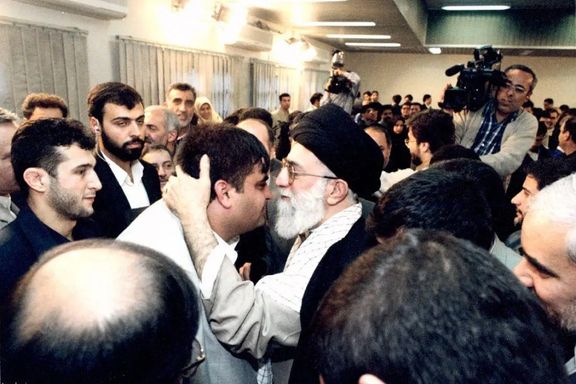
The undue influence the Islamic Republic exerts over athletes has been aggravating the dichotomy of those with and against the regime in Iran, where several athletes face suspensions and legal actions for simply criticizing the authorities. The schism between the popular athletes who have chosen to be on the side of people and the ones who have been vocal supporters of the regime has especially been deepening since the 2022 protests. A large number of athletes at different levels have been persecuted for expressing solidarity with the nationwide protests following the death of Mahsa Amini in police custody in September 2022. Several of these have since been forced into exile in sports from chess to football.
Amidst growing tensions between the government and the populace, football, the most popular sport in the world, has morphed into a battleground for ideological conflict. A special predicament is the support for the Iranian football (soccer) team, whose members met with President Ebrahim Raisi just before leaving for Qatar for the World Cup in 2022. Later it was revealed that the players were given permits to import foreign cars without paying taxes. In spite of this, they refused to sing the national anthem at the games in Doha, causing mass outrage in Tehran for the rebellion. In their following match, they sang the anthem.
A growing number of Iranian athletes have been defecting from the Iranian squad to represent other countries in international competitions. Around 30 Iranian athletes have defected in recent years, seeking asylum in other countries while the trend is gaining momentum following the 2022 protests. In addition to dress code restrictions, another issue forcing Iranian athletes to defect is Tehran’s policy of not allowing them to compete against Israelis.